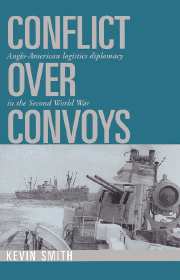Book contents
- Frontmatter
- Contents
- List of maps
- List of tables
- Preface
- List of abbreviations and codewords
- Introduction
- 1 “Not what it could or should be”: Britain's shipping situation
- 2 “Beyond our power without your help”: Britain's Battle of the Atlantic
- 3 “But westward, look, the land is bright”: American shipping assistance from neutrality to belligerency, March 1941–November 1942
- 4 Roosevelt's promise: “your requirements will be met”
- 5 The Casablanca Conference and its aftermath: a “most curious misunderstanding”
- 6 Reaping the whirlwind: the perils of impending victory
- Postscript and conclusions
- Appendices
- Tables
- Notes
- Bibliography
- Index
4 - Roosevelt's promise: “your requirements will be met”
Published online by Cambridge University Press: 06 July 2010
- Frontmatter
- Contents
- List of maps
- List of tables
- Preface
- List of abbreviations and codewords
- Introduction
- 1 “Not what it could or should be”: Britain's shipping situation
- 2 “Beyond our power without your help”: Britain's Battle of the Atlantic
- 3 “But westward, look, the land is bright”: American shipping assistance from neutrality to belligerency, March 1941–November 1942
- 4 Roosevelt's promise: “your requirements will be met”
- 5 The Casablanca Conference and its aftermath: a “most curious misunderstanding”
- 6 Reaping the whirlwind: the perils of impending victory
- Postscript and conclusions
- Appendices
- Tables
- Notes
- Bibliography
- Index
Summary
I wish to give you the definite assurance, subject to the qualifications I have indicated, that your requirements will be met.
Franklin Roosevelt, 30 November 1942Most unfortunately, the President's letter was not preceded by any effective examination of the consequences and discussion with those affected.
Arthur Salter, 2 January 1943… the impossibility of allocating the required tonnage during first four months of 1943 will make it impracticable if not impossible to allocate throughout first half of 1943 one half of presently estimated tonnage required during entire year.
WSA qualification of Roosevelt's promise, 18 January 1943These excerpts from Anglo-American communications in November 1942–January 1943 illustrate the flaws in America's belated answer to Britain's pleas for American shipping allocations. Sir Arthur Salter had been unable to pry loose large and immediate shipping allocations through the Combined Shipping Adjustment Board (CSAB). Then an opportunity arose for a direct appeal to President Roosevelt in November 1942. Minister of Production Oliver Lyttelton's mission to America provided a chance to achieve an authoritative definition of American aid that would bolster imports and enable informed decisions about manpower allocations and production. Churchill's representatives thereby used his relationship with Roosevelt to achieve a “definite assurance” of assistance. Roosevelt promised Churchill on 30 November 1942 that the United States would supplement British carrying capacity by transporting 7 million additional tons of imports in 1943. Yet actual rescue remained more remote than ever.
- Type
- Chapter
- Information
- Conflict over ConvoysAnglo-American Logistics Diplomacy in the Second World War, pp. 97 - 132Publisher: Cambridge University PressPrint publication year: 1996



